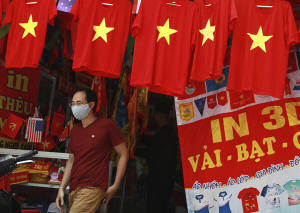Vietnam's strict new social media regulations strangle free speech,
report says
 Send a link to a friend
Send a link to a friend
 [February 18, 2025]
By DAVID RISING [February 18, 2025]
By DAVID RISING
BANGKOK (AP) — New government regulations on social media in Vietnam
give authorities increased powers to prevent dissent and control the
news, along with the tools to more easily track down critics and silence
them, according to an analysis released Tuesday.
Vietnam's authorities implemented “Decree 147” in December, tightening
regulations on social media companies like Facebook, X, YouTube and
TikTok in a bid to further stifle criticism, said Ben Swanton, one of
the authors of the report by The 88 Project, a group focused on human
rights and free speech issues in Vietnam.
“Any challenge to the government and the Communist Party, any
significant challenge to their official narrative of events, is
perceived by them as a situation that is getting out of control,” he
said in an interview from Thailand.
Among other things, the decree requires users to verify their accounts
with phone numbers or national ID cards that must be provided to the
government upon request, and for the social media companies to store
their data in Vietnam.
It also prevents social media users from engaging in citizen journalism
or posting information about suspected government wrongdoing, and
requires companies to remove posts deemed illegal within 24 hours. The
decree requires companies to allow authorities access to their internal
search engines so that it can identify offending content.

Social media companies have until late March to be in compliance, and it
is not yet clear whether they will try to push back. TikTok and Facebook
refused to comment on their plans, while X and Google, which owns
YouTube, did not return emails.
Already, however, researchers have noticed a decline in political posts,
Swanton said.
“In the last several years Hanoi has imprisoned or forced into exile the
country’s most prominent independent journalists, reformers, human
rights activists, and dissidents. This has had a chilling effect that
encourages people to engage in self-censorship,” he said. “Decree 147 is
designed to turn this chilling effect into an icy stranglehold on free
speech.”
Vietnamese authorities did not respond to a request for comment on the
Project 88 analysis or the intent behind the new decree.
[to top of second column]
|

A man walks past a row of T-shirts printed with Vietnamese flags in
Hanoi, Vietnam on July 30, 2020.(AP Photo/Hau Dinh, File)

Authorities tighten the screws on critical reporting
About 65 million Vietnamese have Facebook accounts, roughly
two-thirds of the population, and some 35 million have YouTube
accounts. About half of Vietnam's people say they get most of their
news from social media.
Already, the government frequently insists critical posts from
outside the country be geo-blocked so they cannot be accessed inside
Vietnam and it has moved quickly to censor posts it deems
unacceptable, like a video of a top minister eating a gold-encrusted
steak in London in 2021 while Vietnam was on COVID-19 lockdown.
In October, a prominent Vietnamese blogger was sentenced to 12 years
in prison for articles and videos exposing the corruption of
government officials, and in January, a prominent Vietnamese lawyer
was sentenced to three years in jail for Facebook posts criticizing
the country's former top judge.
Project 88 researchers said the new decree will also give
authorities better tools to go after those who just read or watch
social media posts as well.
They noted a case last June in which police in one province went
through the profiles of 13,328 members of a Facebook group that had
information deemed “hostile to the state” and identified 20 people
in their province, went to their homes and demanded they leave the
group.
“If implemented as intended, Decree 147 would likely make it less
time consuming to identify members of groups like this and ensure
that groups with anti-state content will be blocked in the country,”
the report said.
It urges social media companies and others affected to refuse to
comply with provisions of the decree that violate free expression
rights, and for the United States and United Nations to pressure
Vietnam to repeal the measure.
All contents © copyright 2025 Associated Press. All rights reserved
 |